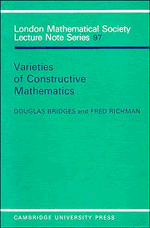3 - RUSSIAN CONSTRUCTIVE MATHEMATICS
Published online by Cambridge University Press: 04 April 2011
Summary
In which the fundamentals of RUSS are presented within a framework constructed from BISH and an axiom derived from Church's thesis. The notion of a programming system is introduced in Section 1, and is used in discussions of omniscience principles, continuity, and the intermediate value theorem. Section 3 deals with Specter's remarkable construction of a bounded increasing sequence of rational numbers that is eventually bounded away from any given (recursive) real number. The next section contains a strong counter-example to the Heine-Borel theorem, and a discussion of the Lebesgue measure of the unit interval and its compact subsets. The last two sections of the chapter deal with Ceitin's theorem on the continuity of real-valued functions.
Programming Systems and Omniscience Principles
The Church-Markov-Turing notion of computability is justly hailed as a milestone in our understanding of effective procedures. However, its use as a general method for viewing mathematics from a constructive point of view has serious disadvantages. Recursive-function-theoretic formulations of theorems appear unnatural to the practicing mathematician, and their proofs are often fraught with forbidding technical terminology that obscures the essential ideas. Indeed, an analyst might be forgiven for believing that the advantages to be gained by an understanding of the theorems of recursive analysis were not worth the effort necessary to achieve this understanding.
Information
- Type
- Chapter
- Information
- Varieties of Constructive Mathematics , pp. 49 - 74Publisher: Cambridge University PressPrint publication year: 1987
